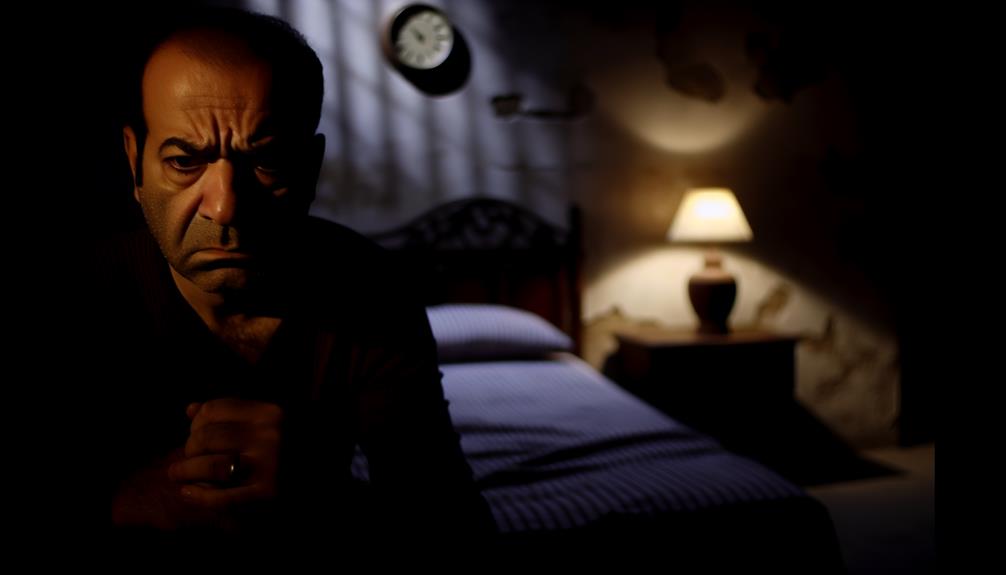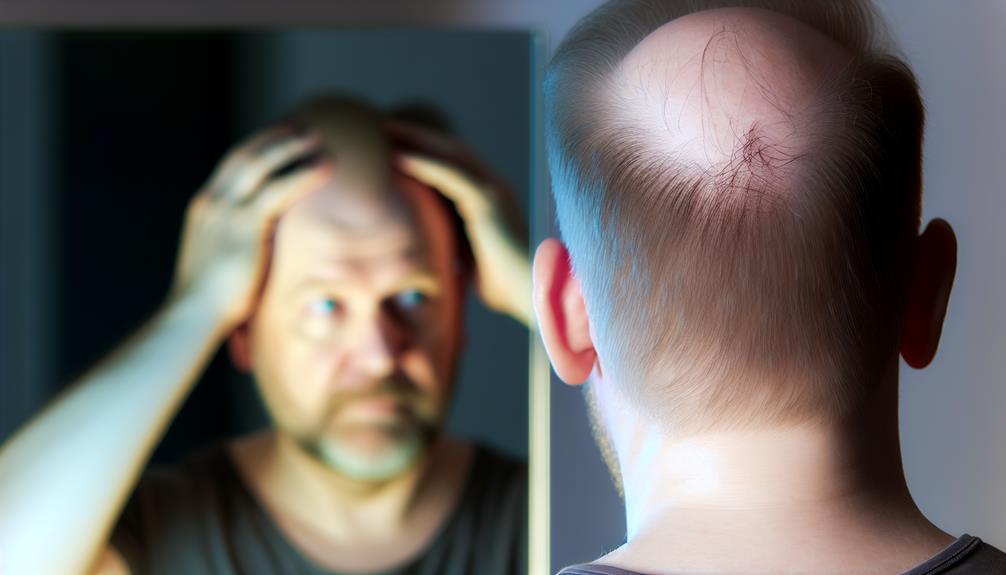I've noticed that signs of hormone imbalance in men can manifest in several ways. Common symptoms include persistent fatigue, mood swings, reduced libido, and weight gain, particularly around the abdomen. Sleep disturbances often accompany these issues, as do changes in skin texture and hair loss. Low testosterone levels are frequently linked to irritability and reduced motivation, while abnormal estrogen levels can contribute to both emotional instability and physical changes. If you recognize any of these symptoms, it's essential to seek professional evaluation to identify the underlying causes and explore effective management strategies. You'll find more insights that can guide you further.
Common Symptoms to Recognize

When it comes to recognizing hormone imbalance in men, there are several common symptoms that shouldn't be overlooked. One of the most notable indicators is changes in mood or emotional state. If you find yourself experiencing increased irritability, anxiety, or even depression, it's essential to reflect on how hormonal fluctuations might be playing a role.
Another symptom to watch for is weight gain, particularly around the abdomen. This can often be attributed to decreased testosterone levels, which can also influence muscle mass. It's essential to look at dietary influences here; a diet high in processed foods and sugars can exacerbate these hormonal issues.
Sleep disturbances are also a significant sign of hormone imbalance. If you're having trouble falling or staying asleep, it may be linked to elevated cortisol levels, often a result of chronic stress—another lifestyle factor that should not be ignored.
Furthermore, a decrease in libido or sexual dysfunction can be alarming but is frequently connected to hormonal changes. It's important to recognize that these symptoms can stem from lifestyle choices, including lack of exercise or poor dietary habits, which can further complicate hormonal health.
Ultimately, recognizing these common symptoms is the first step toward addressing potential hormone imbalances. By being mindful of how dietary influences and lifestyle factors affect our hormone health, we can take proactive measures to restore balance in our bodies.
Fatigue and Low Energy
I often see fatigue and low energy as common complaints among men, and it's essential to understand their underlying causes. Hormonal imbalances, particularly in testosterone and thyroid levels, can considerably contribute to these symptoms. To address this, exploring hormonal testing options can provide valuable insights into what's happening in your body.
Common Causes of Fatigue
Fatigue can stem from various factors, and understanding these common causes is essential for identifying potential hormone imbalances. One significant contributor to fatigue is lifestyle factors. In my experience, inadequate sleep, high-stress levels, and a lack of physical activity can drastically affect energy levels. If I neglect these areas, I notice a marked decline in my overall energy.
Nutritional deficiencies also play an important role in how I feel day-to-day. For instance, insufficient intake of vitamins such as B12 and D, along with minerals like magnesium and iron, can lead to tiredness. When my diet lacks these necessary nutrients, it's not uncommon for me to feel drained and lethargic.
Moreover, certain medical conditions, such as hypothyroidism or diabetes, can exacerbate fatigue. These conditions often interplay with hormonal health, highlighting the significance of addressing both dietary and lifestyle choices. If I find myself persistently fatigued, it's important to evaluate these common causes. By doing so, I can take informed steps toward restoring balance and improving my overall well-being. Addressing these factors is important for anyone experiencing ongoing fatigue.
Symptoms of Low Energy
Low energy manifests in various ways, often linked to underlying hormonal imbalances. As I've observed, the symptoms can be subtle yet pervasive, impacting daily life considerably. Recognizing these signs is essential for energy restoration and implementing necessary lifestyle adjustments.
Here are some common symptoms of low energy I've noted:
- Persistent fatigue, even after a full night's sleep
- Difficulty concentrating or brain fog
- Decreased motivation and productivity
- Increased irritability or mood swings
- Lack of enthusiasm for activities once enjoyed
These symptoms often stem from hormonal fluctuations, particularly involving testosterone, cortisol, and thyroid hormones. When these hormones are out of balance, it can lead to a cascade of effects that diminish energy levels.
Addressing low energy isn't merely about rest; it often requires a multifaceted approach. Incorporating lifestyle adjustments such as regular exercise, a balanced diet, and stress management techniques can greatly enhance energy levels. Additionally, understanding the root cause of fatigue allows for more precise interventions, leading to improved overall well-being. If you're experiencing these symptoms, it might be time to evaluate your hormonal health and consider making strategic lifestyle changes.
Hormonal Testing Options
Understanding hormonal testing options is essential for identifying the underlying causes of fatigue and low energy. In my experience, choosing the right testing method can greatly impact the approach to treatment, whether that involves hormone therapy, lifestyle adjustments, or dietary changes. Here's a breakdown of common testing methods:
| Testing Method | Description |
|---|---|
| Saliva Testing | Measures hormone levels in saliva, often used for cortisol and sex hormones. |
| Blood Tests | Most common method; assesses hormone levels directly in the bloodstream. |
| Urine Analysis | Evaluates hormone metabolites; useful for thorough hormonal profiles. |
| Age Factors | Hormone levels can decline with age, influencing test selection. |
| Medical History | Previous health issues can guide which tests are most relevant. |
Mood Changes and Irritability

I've observed that mood changes and increased irritability can often signal a hormone imbalance in men. Emotional fluctuations can manifest in various ways, affecting not only personal well-being but also relationships. Understanding these symptoms is essential for addressing the underlying hormonal issues and improving overall emotional health.
Emotional Fluctuations Explained
Many men experience notable emotional fluctuations that can be traced back to hormone imbalances, particularly involving testosterone and cortisol levels. These fluctuations often manifest as mood changes and irritability, which can greatly impact daily life and relationships. Understanding the interplay between these hormones and emotional triggers is vital.
Here are some common emotional fluctuations linked to hormone imbalances:
- Increased anxiety: Elevated cortisol can lead to heightened feelings of stress.
- Sudden anger: Low testosterone may contribute to irritability and aggressive outbursts.
- Depressive moods: Hormonal shifts can lead to feelings of sadness and lack of motivation.
- Mood swings: Rapid changes in emotions can be disorienting and challenging to manage.
- Difficulty concentrating: Hormonal imbalances can impair cognitive function, leading to frustration.
To better cope with these emotional fluctuations, it's essential to identify personal emotional triggers and develop effective coping strategies. Lifestyle changes, such as exercise, mindfulness, and proper nutrition, can also help stabilize hormone levels and improve emotional well-being. By addressing these imbalances, you can regain control over your emotions and enhance your quality of life.
Increased Irritability Symptoms
Irritability can often be a subtle yet significant symptom of hormone imbalance in men. When I've experienced heightened irritability, I noticed it wasn't just a fleeting annoyance; it could be linked to fluctuations in testosterone or other hormones in my body. This irritability often manifests as a short temper, impatience, or an overwhelming sense of frustration over minor issues.
Understanding the connection between hormone levels and mood changes is vital. For instance, low testosterone can lead to increased stress and emotional instability, making it harder to manage daily challenges. I've found that effective stress management techniques can be invaluable in addressing these symptoms. Incorporating regular physical activity, practicing mindfulness, or engaging in hobbies can serve as excellent coping strategies.
Additionally, maintaining a balanced diet and ensuring adequate sleep can support hormonal health, ultimately reducing irritability. It's essential to pay attention to these signs, as they may signal a need to evaluate my hormonal levels. Recognizing irritability as a potential symptom of hormone imbalance has allowed me to approach my mental health more holistically, taking actionable steps to restore balance and improve my overall well-being.
Impact on Relationships
Hormone imbalances can profoundly affect relationships, often manifesting through mood changes and irritability. I've noticed that when my hormones are off, it creates significant communication barriers with my partner. The emotional disconnect can lead to trust issues, making it challenging to navigate intimacy. My irritability can escalate trivial disagreements into larger conflicts, heightening relationship stress.
To effectively manage these challenges, I've found it essential to adopt specific strategies:
- Open communication: Discuss feelings and concerns transparently.
- Partner support: Engage my partner in lifestyle adjustments that promote well-being.
- Coping strategies: Implement stress-reduction techniques, like mindfulness or exercise.
- Conflict resolution techniques: Focus on finding common ground rather than winning arguments.
- Understanding each other: Foster empathy to navigate mood swings together.
Changes in Libido
A significant change in libido can be one of the most noticeable signs of a hormone imbalance in men. When I observe libido fluctuations, it often raises a red flag regarding underlying hormonal issues. Testosterone, the primary male sex hormone, plays an essential role in regulating sexual desire. Low testosterone levels can lead to a marked decrease in libido, while elevated levels can cause heightened sexual urges, complicating the overall balance.
In my experience, men might encounter sexual dysfunction, which manifests not only as a reduced interest in sexual activity but also as difficulties in achieving or maintaining an erection. These symptoms can stem from a variety of factors, including stress, lifestyle choices, and, importantly, hormonal levels. When testosterone levels drop, it can disrupt the delicate equilibrium of other hormones, leading to libido fluctuations that can be distressing.
It's important to recognize that these changes aren't just a natural part of aging; they often signal something more significant. If you notice these shifts in your sexual desire, it's worth considering a thorough evaluation of your hormone levels. Sometimes, addressing the root cause—like lifestyle adjustments or medical interventions—can restore your libido to a healthier state.
Weight Gain and Muscle Loss

Weight gain and muscle loss are often telltale indicators of hormonal imbalances in men. I've observed that these changes can noticeably impact overall health, often signaling underlying issues like testosterone deficiency and metabolic syndrome. When testosterone levels decline, it can lead to an increase in body fat and a decrease in lean muscle mass, creating a cycle that can be hard to break.
Here are some key aspects to reflect upon regarding weight gain and muscle loss due to hormonal imbalances:
- Increased Body Fat: Elevated estrogen levels can lead to fat accumulation, particularly in the abdominal area.
- Reduced Muscle Strength: Low testosterone can hinder muscle protein synthesis, resulting in decreased muscle mass.
- Metabolic Changes: Hormonal imbalances can disrupt metabolic processes, contributing to weight gain and insulin resistance.
- Mood Fluctuations: Changes in hormones can lead to emotional instability, which may result in overeating or poor dietary choices.
- Energy Levels: Fatigue and reduced energy can make it challenging to maintain an active lifestyle, further exacerbating weight gain and muscle loss.
Recognizing these signs is vital for addressing potential hormonal imbalances. If you're experiencing noticeable weight gain alongside muscle loss, it might be time to consult a healthcare professional. Understanding the interplay between hormones and physical health can empower you to take proactive steps towards restoration and balance.
Sleep Disturbances
Experiencing sleep disturbances can be a significant red flag for hormonal imbalances in men. I've noticed that when my sleep quality declines, it often correlates with fluctuations in my hormone levels, particularly testosterone. Research shows that low testosterone can lead to increased nighttime awakenings, making it hard to achieve the restorative sleep my body craves.
When I find myself waking up multiple times during the night, it's not just frustrating; it's also a signal that something might be off hormonally. Studies indicate that men with hormonal imbalances often report difficulties falling asleep and maintaining sleep, which can disrupt the circadian rhythm. This disruption impacts not just my energy levels but also my overall well-being.
Moreover, poor sleep quality can lead to a vicious cycle. As my hormones become increasingly imbalanced, I may experience heightened stress or anxiety, which further impairs my ability to sleep soundly. Cortisol, the stress hormone, tends to rise when testosterone levels drop, exacerbating issues like insomnia.
I've learned that addressing these sleep disturbances is vital. It's essential to monitor my sleep patterns and recognize the signs of hormonal imbalance. If you're experiencing similar issues, it might be worth consulting a healthcare professional to explore potential underlying causes. By prioritizing better sleep and understanding its connection to hormone health, I can take proactive steps toward restoring balance in my life.
Hair Loss and Skin Changes

Hair loss and changes in skin texture can serve as subtle yet significant indicators of hormonal imbalance in men. As I've observed, fluctuations in hormone levels, particularly testosterone, can lead to noticeable alterations in both hair and skin. For instance, when testosterone levels drop, you might experience increased scalp sensitivity and thinning hair, which can be distressing.
Changes in skin texture are equally telling. A decrease in testosterone may contribute to drier, less elastic skin, making it appear aged or uneven. It's vital to recognize these signs early, as they can impact both physical appearance and self-esteem.
Here are some specific signs related to hair loss and skin changes that might indicate a hormonal imbalance:
- Increased hair thinning or bald patches on the scalp
- Heightened scalp sensitivity or discomfort
- Dry, flaky, or itchy skin, especially on the face and scalp
- Noticeable changes in skin texture, such as roughness or sagging
- A shift in oil production, leading to oily skin or acne
Being aware of these symptoms is essential. They not only reflect hormonal levels but can also signal underlying health issues. If you find yourself experiencing a combination of hair loss and skin changes, it may be time to reflect on the role hormones play in your overall well-being. Keeping an eye on these signs can help you maintain both your appearance and health.
Importance of Seeking Help
Recognizing the significance of seeking help for hormone imbalances is essential for maintaining overall health and well-being. As I've learned, many men may ignore symptoms like fatigue, mood swings, or changes in libido, attributing them to stress or aging. However, untreated hormone imbalances can lead to serious health issues, including cardiovascular disease, diabetes, and osteoporosis. This is where professional guidance becomes important.
When I decided to consult a healthcare professional, I found that the right support systems made a significant difference. A qualified endocrinologist or urologist can evaluate hormone levels through blood tests and provide insights into lifestyle changes, medications, or therapies that can restore balance. It's critical not to self-diagnose; hormone levels fluctuate, and a professional can accurately interpret results in the context of my overall health.
Moreover, seeking help means I'm not alone in this journey. Support systems, whether through friends, family, or support groups, can provide encouragement and understanding. Often, discussing these challenges openly can help reduce stigma and anxiety surrounding hormone issues. By sharing experiences and knowledge, I've realized that many men face similar struggles.
Frequently Asked Questions
What Causes Hormone Imbalance in Men?
When I think about what causes hormone imbalance in men, I find that testosterone decline is a significant factor. As men age, testosterone levels naturally decrease, leading to various health issues. Additionally, exposure to endocrine disruptors, like certain chemicals in plastics and pesticides, can further exacerbate hormonal imbalances. It's essential to understand these influences, as they can impact overall well-being and quality of life, making awareness key in managing health.
Can Diet Impact Hormone Levels in Men?
Absolutely, I've found that diet can greatly impact hormone levels. My dietary choices play an important role in maintaining balance; for instance, a lack of essential nutrients can lead to deficiencies that disrupt hormonal functions. When I prioritize whole foods, healthy fats, and adequate protein, I notice improvements in my overall well-being. Conversely, excessive sugars and processed foods can exacerbate imbalances, so it's essential to be mindful of what I consume.
Are There Natural Remedies for Hormone Imbalance?
Isn't it amusing how we often overlook simple solutions? When I explored natural remedies for hormone imbalance, I was surprised to find herbal supplements like ashwagandha and maca root can be quite effective. Coupled with lifestyle changes—like stress management and proper sleep—these remedies helped me regain balance. It's fascinating how nature offers tools that, when combined with informed choices, can greatly impact our well-being. Who knew the answer was right in front of us?
How Can Stress Affect Hormone Levels in Men?
Stress can greatly affect hormone levels, especially cortisol. When I experience high stress, my cortisol levels spike, which can disrupt other hormones and lead to various health issues. Effective stress management techniques, like mindfulness or exercise, can help stabilize these levels. I've noticed that when I actively manage stress, I feel more balanced overall, which suggests that addressing stress is essential for maintaining healthy hormone levels and overall well-being.
Is Hormone Therapy Safe for Men Experiencing Imbalance?
Did you know that nearly 40% of men over 45 may experience hormone imbalances? When considering hormone therapy, I find it essential to weigh the hormone therapy benefits against the hormone therapy risks. While it can alleviate symptoms and improve quality of life, potential side effects like increased cardiovascular risks can't be overlooked. Consulting a healthcare professional is vital for making an informed decision tailored to individual health needs.
